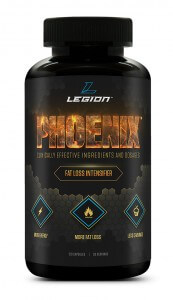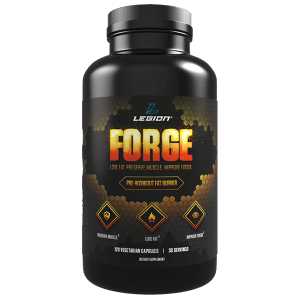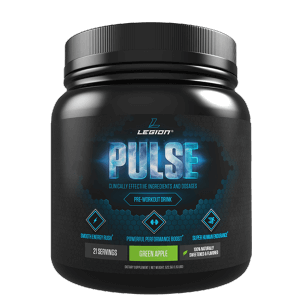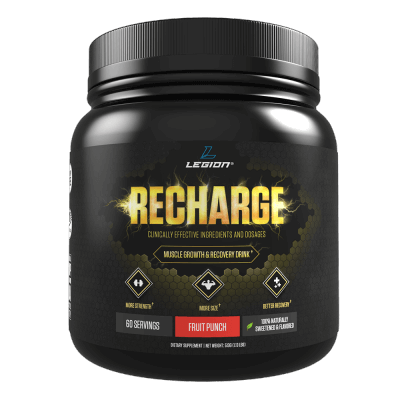I have a rather long list of things in the fitness space that annoy the shit out of me.
To name a few…
- Starvation dieting
- Low-carb mania
- Most fitness magazines
- The cult of “clean eating“
- “Weight loss foods“
- Supplement shenanigans
- Celebrity workouts
- Most weightlifting advice given to women
If you feel the same way, you’ve come to the right place. We were tarred with the same brush.
And in this article, we’re going to talk all about exercise and weight loss and how to best go about it.
I have good news, too.
You can reach your goals without sacrificing your life to the treadmill.
In fact, you can get as lean as you want without ever doing more than a couple hours of cardio per week.
(You can eat foods you actually like, too.)
If that sounds too good to be true, I understand.
Suspend your disbelief, though, and in ten minutes, you’ll know things most people will never know about not just losing weight but building a body they can be proud of.
Let’s get to it.
Table of Contents
+Want to listen to more stuff like this? Check out my podcast!
Why You Don’t Want to Just Lose Weight
If someone feels too fat, he’ll probably say he needs to lose weight.
What he means to say, though, is he needs to lose fat and not muscle.
There’s a big difference here.
If your goal is simply reducing the number on the scale, you can thoroughly accomplish this…and wind up skinny fat.
This is because many popular weight loss regimens restrict food intake too heavily and involve far too much exercise, and the result is considerable loss of both fat and muscle.
If, however, you reduce your body fat percentage while maintaining or gaining muscle, you’ve done the opposite–you’ve improved your body composition.
If this is obvious to you, you’re in the minority.
Most people don’t realize how much muscle they can lose with a poorly designed weight loss routine and how weak and soft they can look when it’s all said and done.
Well, it doesn’t have to be this way.
If you follow the exercise advice in this article and the diet advice here, you will have everything you need to lose fat and not muscle (and possibly even lose fat and gain muscle).
Why Cardio Isn’t a Great Weight Loss Workout
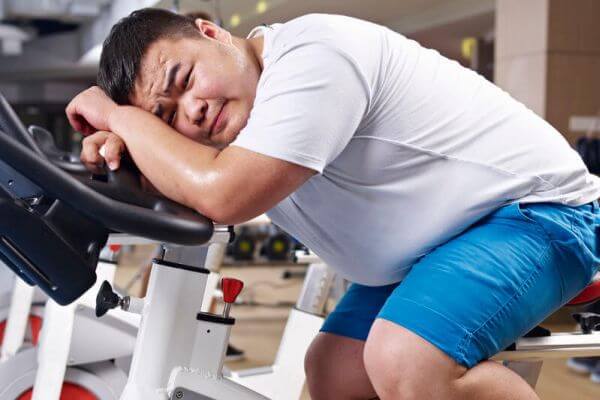
What’s one of the first things most people think they have to do to lose weight?
Exercise, of course.
And when most people start exercising to lose weight, what’s their default choice?
Yup–some form of cardio, like jogging, swimming, biking, or the like.
This is all well and good but, unfortunately, simply doing cardio guarantees little in the way of weight loss.
In fact, many people wind up even fatter than when they began their exercise routines.
Hence the crowds of overweight people addicted to burning calories instead of getting fit.
There are two primary reasons for this.
It’s too easy to eat the calories you burn.
Guess how much energy 30 minutes of vigorous running burns?
For someone that weighs 150 pounds, about 400 calories.
And guess how easy it is to eat that right back?
A handful of nuts, a yogurt, and an apple does the trick. Or if you’re the more indulgent type, a measly chocolate chip cookie with a cup-and-some of milk.
My point isn’t that you shouldn’t eat nuts, yogurt, apples, or cookies when you want to lose weight, of course, but that exercise just doesn’t burn as much energy as we wish it did.
Yes, the energy you do burn during cardio does support your weight loss efforts, but your goal isn’t to just burn calories, it’s to lose fat. And if you’re eating too much, no amount of cardio is going to get you leaner.
Your body adapts to the exercise to reduce caloric expenditure.
If someone at least halfway informed hits a weight loss plateau, she will suspect the obvious: overeating. (And she will know how easy it is to accidentally overeat!)
What she probably won’t suspect, though, is that her body has adapted to burn less energy during exercise.
Research shows that when in a calorie deficit, the body strives to increase energy efficiency.
This means that, as time goes on, less and less energy is needed to continue doing the same types of workouts.
This also means that you’re no longer burning as much energy as you think you are, which increases the likelihood of overeating (which causes the dreaded plateau).
Many people stuck in this quandary refuse to give up, though, and try to beat it with more cardio.
This may raise energy expenditure enough to get the weight loss needle moving again, but it can also accelerate muscle loss and metabolic slowdown.
All this is why I generally recommend that people keep cardio to a minimum when dieting to lose fat.
That is, the less cardio you can do while still reaching your weight loss goals, the better.
How does that work, though? What’s a workable minimum?
The Best Type of Cardio for Weight Loss

While I used to beat the drum exclusively for HIIT, I’ve since changed my tune.
This was because I used to recommend that people do just enough cardio to achieve their body composition goals and no more. Since HIIT burns more calories per minute than steady-state cardio, it seemed like the better option, and this minimalist approach toward cardio worked well for myself and many others.
I was also excited about evidence suggesting that HIIT was inherently better for fat loss than steady-state cardio.
As research on the topic has advanced, though, we now have a better understanding of the true benefits of HIIT.
On the one hand, research clearly shows that you burn up to three to four times more calories per minute than steady-state cardio, depending on how hard you push yourself. Go HIIT.
On the other hand, research also shows that HIIT doesn’t have any magical fat-melting properties or other fat loss advantages, and that it has a few other important disadvantages compared to steady-state cardio. Boo, HIIT.
Namely, you can only do so much HIIT every week, because it causes more fatigue, muscle damage, and wear and tear on the body (and especially high-impact stuff like running sprints). This is why research shows that it tends to interfere with strength training more than steady-state cardio.
And since you can only do relatively small amounts of HIIT, the absolute number of calories you can burn per week is less substantial than many people realize.
With that in mind, here’s what to do:
- At least two low- to moderate-intensity cardio workouts (walking, cycling, or rucking, for example) per week of 20-to-40 minutes each.
- One HIIT workout per week if you enjoy it.
- No more than 2-to-3 hours of cardio per week.
- Cardio and weightlifting on separate days. If that isn’t possible, lift weights first and try to separate the two workouts by at least 6 hours.
The Truth About Weightlifting and Weight Loss
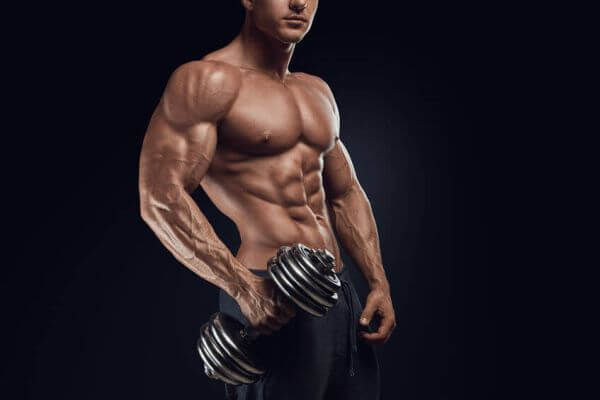
If research clearly shows that weightlifting is an effective way to accelerate fat loss, why is it generally associated with “bulking up” and not “slimming down”?
Well, weightlifting isn’t a popular way to lose weight, and for good reason:
It’s a bad way to lose weight…but a fantastic way to speed up fat loss and preserve muscle.
A study conducted by scientists at Duke University illustrates my point perfectly.
Researchers recruited 196 men and women ranging from 18 to 70 years old and split them into three groups:
1. Resistance training
These volunteers exercised three days per week and did 24 sets per workout using resistance machines. Each workout lasted about an hour.
2. Aerobic training
These volunteers jogged 3 days per week at a moderate intensity for about 45 minutes per session.
3. Resistance and aerobic training
These volunteers did both of the routines above, putting their total weekly exercise time just over 5 hours.
After eight months, guess which group lost the most weight?
Number two–the aerobic training group…the only group that lost muscle as well.
And guess who lost the most fat and gained muscle?
That’s right–group number three.
These findings are in line with several other studies as well, and the picture is clear:
If you want to lose fat faster and preserve or even build muscle, you want to do both weightlifting and cardio.
What kind of weightlifting should you be doing, you wonder?
The Best Type of Weightlifting for Weight Loss

The best type of weightlifting for weight loss would do two things:
- Effectively preserve or build muscle.
- Burn a lot of energy.
And the type of weightlifting program that best meets both targets is one that emphasizes heavy, compound weightlifting.
By “heavy,” I mean handling weights that are 70%+ of your one-rep max (and ideally closer to 80 to 85%).
This isn’t only best for building muscle–it’s great for burning fat, too.
A study published by Greek sports scientists found that men that trained with heavy weights (80 to 85% of their one-rep max) increased their metabolic rates over the following three days, burning hundreds more calories than the men that trained with lighter weights (45 to 65% of their 1RM).
Similar effects have been seen in other studies as well.
And by “compound weightlifting,” I mean focusing on the big movements like the squat, deadlift, and bench and overhead press.
We don’t really need science to tell us that squatting burns more energy than biceps curling, but research has confirmed that exercises that involve large muscle groups burn more energy–both during and after training–than exercises that involve smaller ones.
So hit the weights and hit them hard if you want to “supercharge your metabolism” and maybe even build muscle and lose fat at the same time.
If you’d like some guidance on actual workouts to do, check out this article.
What About Supplements?

I saved this for last because, quite frankly, it’s far less important than proper diet and training.
You see, supplements don’t build great physiques–dedication to proper training and nutrition does.
Unfortunately, the workout supplement industry is plagued by pseudoscience, ridiculous hype, misleading advertising and endorsements, products full of junk ingredients, underdosing key ingredients, and many other shenanigans.
Most supplement companies produce cheap, junk products and try to dazzle you with ridiculous marketing claims, high-profile (and very expensive) endorsements, pseudo-scientific babble, fancy-sounding proprietary blends, and flashy packaging.
So, while workout supplements don’t play a vital role in building muscle and losing fat, and many are a complete waste of money…the right ones can help.
The truth of the matter is there are safe, natural substances that have been scientifically proven to deliver benefits such as increased strength, muscle endurance and growth, fat loss, and more.
As a part of my work, it’s been my job to know what these substances are, and find products with them that I can use myself and recommend to others.
Finding high-quality, effective, and fairly priced products has always been a struggle, though.
That’s why I took matters into my own hands and decided to create my own supplements. And not just another line of “me too” supplements–the exact formulations I myself have always wanted and wished others would create.
I won’t go into a whole spiel here though. If you want to learn more about my supplement line, check this out.
For the purpose of this article, let’s just quickly review the supplements that are going to help you get the most out of your efforts to build muscle and lose fat.
PHOENIX Fat Burner
With the weight loss market valued at a staggering $60.5 billion and more than one-third of U.S. adults obese, it’s no surprise that there’s a glut of “fat burners” for sale these days.
And for the same reasons it’s also no surprise that fat burners are some of the most expensive supplements on the shelves and feature some of the loudest marketing claims, often making big promises of “scientifically proven” rapid fat loss.
The reality is most “fat burners” are junk but there are a handful of natural, safe substances that have been scientifically proven to accelerate fat loss. And that’s why I created PHOENIX.
PHOENIX’s caffeine-free formulation is helps you burn fat faster in three different ways:
- It dramatically increases metabolic speed.
- It amplifies the power of fat-burning chemicals produced by your body.
- It increases the feeling of fullness from food.
It accomplishes this through clinically effective dosages of several ingredients, including…
- Synephrine. This increases both basal metabolic rate and lipolysis, inhibits the activity of certain fat cell receptors that prevent fat mobilization, and increases the thermic effect of food (the “energy cost” of metabolizing food).
- Naringin. This stimulates the production of a hormone called adiponectin, which is involved in the breakdown of fat cells, and that it activates a type of receptor in fat cells that regulates fat mobilization (the PPARα receptor).
Through these mechanisms, naringin also works synergistically with synephrine and hesperidin to further accelerate the basal metabolic rate.
- Hesperidin. Like naringin, this also stimulates the production of adiponectin and activates the PPARa receptor. It also improves blood flow and reduces the inflammation of blood vessels.
- Epigallocatechin gallate (EGCG). This inhibits the activity of a different enzyme also responsible for breaking down neurotransmitters that induce lipolysis. It has also been shown to reduce abdominal fat in particular.
- Forskolin. This increases blood plasma and intracellular levels of a molecule known as cAMP. When cAMP is high, it signifies a lack of ATP (the most basic form of cellular energy in the body) and thus initiates a process to make more ATP by burning through energy reserves (body fat).
Research has show that supplementation with forskolin accelerates fat loss and increases testosterone levels.
- And more…
The bottom line is if you want to lose fat faster without pumping yourself full of stimulants or other potentially harmful chemicals…then you want to try PHOENIX.
Yohimbine
Yohimbine is a chemical extracted from a species of African plant, Yohimbe.
Studies show that yohimbine can accelerate fat loss by blocking the activity of alpha-receptors in fat cells.
This enables your body to reduce fat stores faster and is particularly useful as you get leaner and are battling with stubborn fat holdouts.
There’s a slight catch with yohimbine, though: elevated insulin levels negate its weight-loss effects. If you want to reap its fat loss benefits, you want to use it when you’re in a fasted state.
Yohimbine’s benefits don’t stop there, though. It does more than help you lose fat faster.
Research shows that yohimbine also improves exercise performance, and it’s particularly effective at fighting off physical fatigue and increasing time to exhaustion.
These are the reasons why I decided to include yohimbine in my pre-workout fat burner FORGE, which was made specifically for maximizing fat loss with fasted training.
Caffeine
Millions of people can’t shake the cobwebs without their morning cups of coffee but this powerful compound has a lot more going for it.
Caffeine helps you lose weight by increasing the amount of energy your body burns throughout the day, and it also improves strength, promotes muscle endurance, and enhances anaerobic performance.
For best results, research has shown that caffeine is best delivered in a pill or powder format, though you must be careful to avoid building up a tolerance to it.
Personally I get my caffeine from my pre-workout PULSE, which also contains clinically effective dosages of 4 other ingredients scientifically proven to improve workout performance:
Creatine
Creatine is a substance found naturally in the body and in foods like red meat. It’s perhaps the most researched molecule in the world of sport supplements–the subject of hundreds of studies–and the consensus is very clear:
Supplementation with creatine helps…
You may have heard that creatine is bad for your kidneys, but these claims have been categorically and repeatedly disproven. In healthy subjects, creatine has been shown to have no harmful side effects, in both short- or long-term usage. People with kidney disease are not advised to supplement with creatine, however.
If you have healthy kidneys, I highly recommend that you supplement with creatine. It’s safe, cheap, and effective.
In terms of specific products, I use my own, of course, which is called RECHARGE.
The Bottom Line on Cardio or Weightlifting for Weight Loss
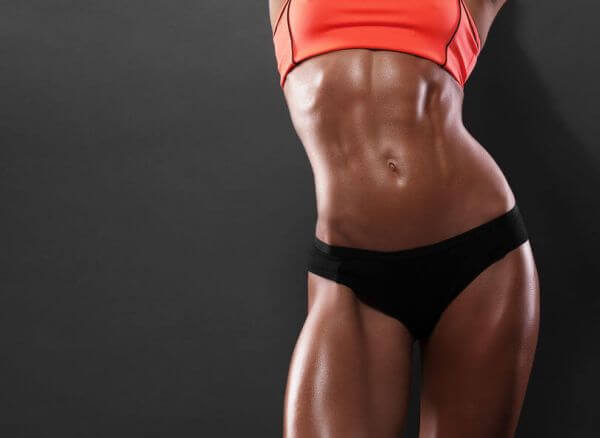
Don’t make fat loss more complicated than it has to be.
- Do a few hours of heavy, compound weightlifting per week.
- Do an hour or two of low- to moderate-intensity cardio per week (and one HIIT workout if you enjoy it).
- Maintain a moderately aggressive calorie deficit.
- Supplement properly.
And you’ll be able to lose weight easily, healthily, and steadily.
What’s your take on cardio or weightlifting for weight loss? Have anything else to share? Let me know in the comments below!
Scientific References +
- Farinatti, P. T. V., & Castinheiras Net, A. G. (2011). The effect of between-set rest intervals on the oxygen uptake during and after resistance exercise sessions performed with large-and small-muscle mass. Journal of Strength and Conditioning Research, 25(11), 3181–3190. https://doi.org/10.1519/JSC.0b013e318212e415
- Fatouros, I. G., Chatzinikolaou, A., Tournis, S., Nikolaidis, M. G., Jamurtas, A. Z., Douroudos, I. I., Papassotiriou, I., Thomakos, P. M., Taxildaris, K., Mastorakos, G., & Mitrakou, A. (2009). Intensity of resistance exercise determines adipokine and resting energy expenditure responses in overweight elderly individuals. Diabetes Care, 32(12), 2161–2167. https://doi.org/10.2337/dc08-1994
- Donges, C. E., & Duffield, R. (2012). Effects of resistance or aerobic exercise training on total and regional body composition in sedentary overweight middle-aged adults. Applied Physiology, Nutrition and Metabolism, 37(3), 499–509. https://doi.org/10.1139/H2012-006
- Ho, S. S., Dhaliwal, S. S., Hills, A. P., & Pal, S. (2012). The effect of 12 weeks of aerobic, resistance or combination exercise training on cardiovascular risk factors in the overweight and obese in a randomized trial. BMC Public Health, 12(1). https://doi.org/10.1186/1471-2458-12-704
- Schwingshackl, L., Dias, S., Strasser, B., & Hoffmann, G. (2013). Impact of different training modalities on anthropometric and metabolic characteristics in overweight/obese subjects: A systematic review and network meta-analysis. In PLoS ONE (Vol. 8, Issue 12). PLoS One. https://doi.org/10.1371/journal.pone.0082853
- Willis, L. H., Slentz, C. A., Bateman, L. A., Shields, A. T., Piner, L. W., Bales, C. W., Houmard, J. A., & Kraus, W. E. (2012). Effects of aerobic and/or resistance training on body mass and fat mass in overweight or obese adults. Journal of Applied Physiology, 113(12), 1831–1837. https://doi.org/10.1152/japplphysiol.01370.2011
- Geliebter, A., Maher, M. M., Gerace, L., Gutin, B., Heymsfield, S. B., & Hashim, S. A. (1997). Effects of strength or aerobic training on body composition, resting metabolic rate, and peak oxygen consumption in obese dieting subjects. American Journal of Clinical Nutrition, 66(3), 557–563. https://doi.org/10.1093/ajcn/66.3.557
- Thomas, D. M., Bouchard, C., Church, T., Slentz, C., Kraus, W. E., Redman, L. M., Martin, C. K., Silva, A. M., Vossen, M., Westerterp, K., & Heymsfield, S. B. (2012). Why do individuals not lose more weight from an exercise intervention at a defined dose? an energy balance analysis. Obesity Reviews, 13(10), 835–847. https://doi.org/10.1111/j.1467-789X.2012.01012.x
- Melanson, E. L., Keadle, S. K., Donnelly, J. E., Braun, B., & King, N. A. (2013). Resistance to exercise-induced weight loss: Compensatory behavioral adaptations. Medicine and Science in Sports and Exercise, 45(8), 1600–1609. https://doi.org/10.1249/MSS.0b013e31828ba942
- Sawyer, B. J., Bhammar, D. M., Angadi, S. S., Ryan, D. M., Ryder, J. R., Sussman, E. J., Bertmann, F. M. W., & Gaesser, G. A. (2015). Predictors of fat mass changes in response to aerobic exercise training in women. Journal of Strength and Conditioning Research, 29(2), 297–304. https://doi.org/10.1519/JSC.0000000000000726
- Durrant, M. L., Garrow, J. S., Royston, P., Stalley, S. F., Sunkin, S., & Warwick, P. M. (1980). Factors influencing the composition of the weight lost by obese patients on a reducing diet. British Journal of Nutrition, 44(3), 275–285. https://doi.org/10.1079/bjn19800042
